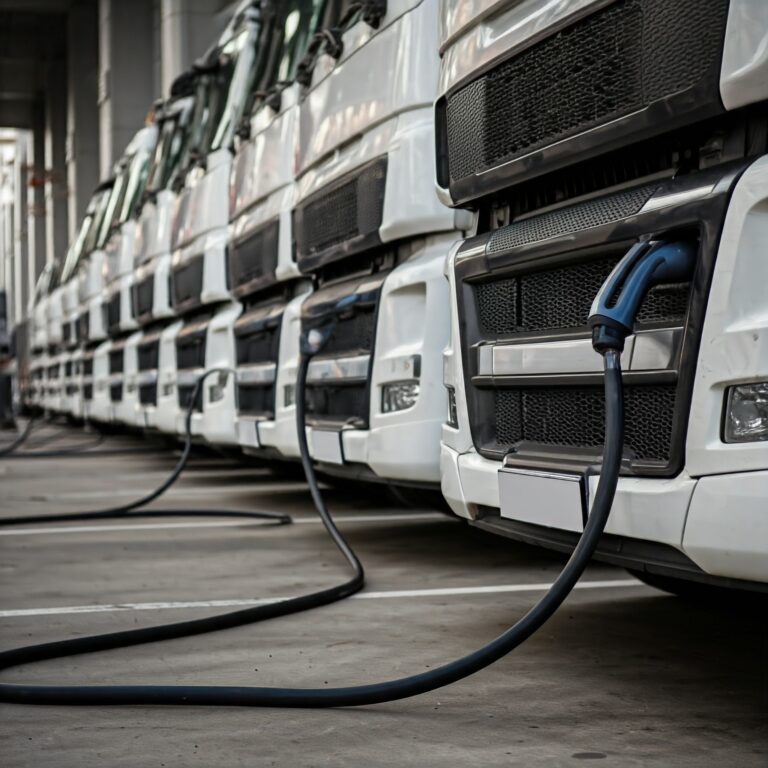Ampcontrol and NACFE Release Whitepaper: ‘Smart Charging for Electric Depots’
As ACT Expo, the nation’s largest and longest-running fleet electrification event kicked off this week in Anaheim, California, Ampcontrol and NACFE (North American Council for Freight Efficiency) released a thought-leading white paper entitled “Smart Charging for Electric Depots.”
One of the most pressing challenges outlined in the report is the inadequacy of current grid infrastructure. Large depots typically require power levels up to 5 megawatts, yet many existing sites were not designed to support such demands. Coordinating with utilities, expanding grid capacity, and securing regulatory approvals can take years—resulting in costly delays that undermine electrification goals. These constraints not only slow deployment but also impact the long-term viability of electric fleet operations.

Beyond infrastructure, fleets must navigate a range of operational and economic complexities. Time-of-use (TOU) energy rates, peak demand charges, and the need for highly reliable charging systems all contribute to the cost and uncertainty of fleet electrification. Moreover, transitioning from diesel to electric introduces new challenges in vehicle scheduling, charge timing, and fleet readiness—all of which must be managed to maintain service levels and avoid downtime.
To address these issues, the report emphasizes the importance of smart charging and energy management platforms. These technologies allow fleet operators to intelligently control charging schedules, balance energy loads, and reduce peak demand. Smart charging not only lowers infrastructure and operational costs, but also enhances reliability and enables better integration of renewables and on-site battery storage. Fleets using these systems can achieve greater energy resilience and cost-efficiency—key factors in making electric trucking sustainable.
The report also provides real-world examples and case studies, illustrating how fleets are already benefiting from these tools. Whether through automated energy management or predictive maintenance integrations with telematics, smart charging is proving to be an essential enabler of scalable and reliable electric fleet operations.
With detailed recommendations for fleets, utilities, and policymakers, this joint effort by Ampcontrol and NACFE offers a roadmap for electrifying the trucking industry. It calls on stakeholders to collaborate more effectively, adopt proven technologies, and streamline regulatory pathways to unlock the full potential of electric freight. By doing so, the industry can accelerate toward a cleaner, more efficient, and more resilient future.
Smart charging has emerged as the cornerstone for enabling the wide-scale deployment of electric truck fleets. Over the past seven years, Ampcontrol has played a leading role in advancing this technology, evolving from managing a handful of vehicles to supporting large-scale depots equipped with semi-trucks, on-site energy storage, and megawatt-level infrastructure. Ampcontrol has helped shape the future of electrified freight, testing with its customers nearly every major commercial vehicle manufacturer—including Volvo, Daimler, BYD, Nikola, and Isuzu.
Yet, as CEO Joachim Lohse notes, the journey is just beginning. Smart charging is not simply a convenience; it is a necessity for fleet electrification to succeed at scale. While battery-electric trucks have proven to be both operationally viable and well-received by drivers, the industry continues to face significant logistical and infrastructural hurdles. The insights and innovations gained through years of hands-on experience are now being shared through this joint effort with the North American Council for Freight Efficiency (NACFE).
“While our platform has grown, I believe smart charging remains the most critical piece to making electric fleets scalable and truly decarbonizing trucking. The industry has made great strides, but we’re still at the beginning of a long journey. That’s what excites us and drives our work every day. Together with NACFE, we hope this report helps fleets and partners navigate the path ahead with confidence and clarity,” said Joachim Lohse, CEO at Ampcontrol.
For over 16 years, NACFE has guided fleets toward greater efficiency through innovative fuel strategies and operational best practices. With its “Run on Less” campaigns—including the recent Run on Less – Electric DEPOT—the organization has chronicled the successes of early adopters and showcased the real-world performance of electric trucks. This collaborative report builds on those findings, offering both strategic insights and practical solutions for overcoming the challenges that still impede progress.
“Having completed four Run on Less efforts, focusing on the successes of early pioneers, NACFE showcases the best of the best in trucking leaning into new technologies and operations. It has always been our hope, even expectation, that the industry would use our work to further its understanding to accelerate adoption. This analysis and report with our friends at Ampcontrol is exactly one of those efforts,” said Mike Roeth, Executive Director at NACFE.
The Advanced Clean Transportation (ACT) Expo is the largest and most comprehensive clean fleet event in North America, bringing together industry leaders, fleet operators, policymakers, and technology innovators to showcase the latest advancements in low- and zero-emission transportation. Held annually, the expo serves as a critical platform for unveiling new technologies, forming strategic partnerships, and discussing key regulatory and infrastructure developments that impact the future of clean mobility. From electric trucks and hydrogen fuel cell vehicles to smart charging solutions and renewable fuels, ACT Expo highlights the full spectrum of sustainable transportation solutions. With a focus on real-world deployment and scalability, the event plays a vital role in accelerating the adoption of cleaner, more efficient fleet operations across the continent.
